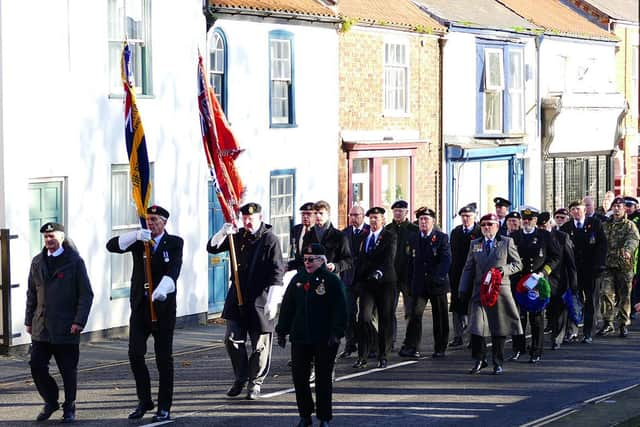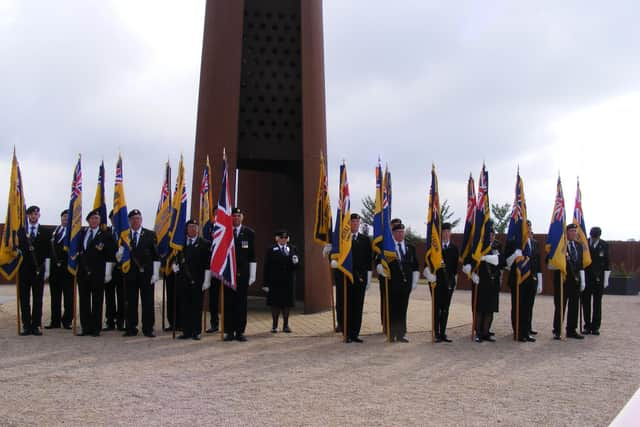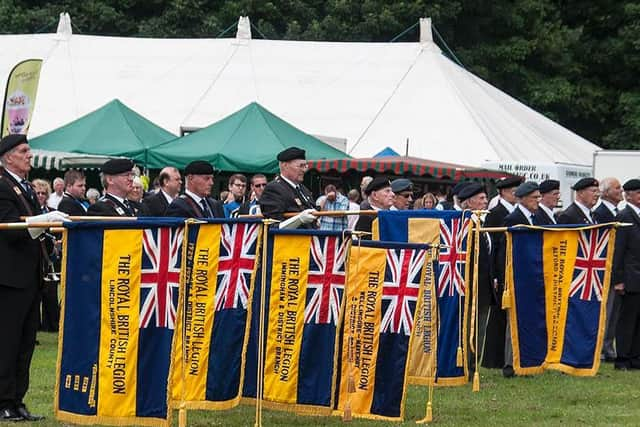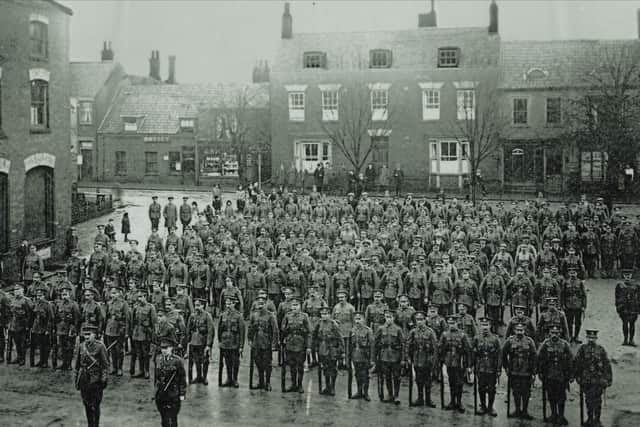100th anniversary celebrations: Spilsby Royal British Legion reflects on its role in the nation’s recovery after First World War


Prime Minister Lloyd George's iconic words after end of First World War were destined to inspire a nation.
Armistice on November 11, 1918, was a time for celebration. However, vast empires had fallen and millions of men had died in conflict or were left were crippled or maimed - many of them returning to life in Lincolnshire and facing difficult circumstances.
Advertisement
Hide AdAdvertisement
Hide AdSpilsby branch of the Royal British Legion is believed to be the earliest one to be formed in Lincolnshire. Denis Chandler, its current chairman, looks at the branch's history in celebration of the local branches 100th anniversary celebrations, which takes place on Saturday with a musical evening featuring the Alford Silver Band, the Creaking Bones Ukelele band and the Spilsby U3A Singing for Fun choir :


When the 'Comrades of the Great War’ met for the first time in Spilsby, the club was never just going to be just a social meeting.
Lloyd George’s promise to those who returned and their families 'to make Britain a fit country for heroes' did not match up to expectations and Lincolnshire's war heroes needed not only comradeship but also support.
The Spilsby branch held its first meeting on April 10, 1919, organised by Mr J M Moreton of the local printing firm W K Moreton and Sons.
Advertisement
Hide AdAdvertisement
Hide AdBy August 1919, the club became known as the Spilsby Ex-servicemen’s Club and was open every evening from 7.30pm until 10pm in the Drill Hall (now the Franklin Hall).


It only adopted its modern name when the British Legion was formed in 1921. The club became affiliated to it on October 8 of that year.
The Spilsby branch played a role in efforts to found branches elsewhere, such as at Alford and Revesby.
The Alford Branch always seemed to be subordinate to Spilsby; Alford members often attended Spilsby meetings and occasionally the monthly Branch meetings were held at Alford.
Advertisement
Hide AdAdvertisement
Hide AdIn the 1930s the Spilsby Benevolent Fund took over the administration of Alford’s fund. It does not appear to have been asked to help the Horncastle Branch which closed in November 1926.


The Spilsby Branch benefited from a donation of £20 from the Spilsby Company of Volunteers and later in 1925 another gift of a similar amount came from the Spilsby Amateur Dramatic Society, whose producer, Major J C Musk was also chairman of the Spilsby Branch of the Legion at that time.
A year earlier, in June 1924, a gift of £10 had been received anonymously for the purchase of a banner for the branch.
Later in the same year a banner holder and cover were purchased. By now the Branch had some 200 members but there were no grounds for complacency – there were still 600 ex-servicemen in the district who were not yet members of the Legion.
Advertisement
Hide AdAdvertisement
Hide AdThe Branch was able to sponsor a bed in the Grace Swan Hospital in Hundleby, to be used for ex-servicemen, their wives and children, thanks to a grant of £208.10.0 from the United Services Club.


In 1922, the branch tried to set up a social club, but failed to sell sufficient of the 120, five shilling shares, to make the project viable. It sought rather to defend the interests of any ex-serviceman for whom Lloyd George’s promise to ’create a land fit for heroes’ did not match up to expectations.
As early as January 1922, the local press was praising the British Legion for its ‘really excellent work in looking after the interests of ex-servicemen’. It naturally viewed members of its own organisation more favourably than non-members but some limited assistance was afforded to them.
The 1928 balance sheet showed payments of £3.18.6d to ex-servicemen on the road.
Advertisement
Hide AdAdvertisement
Hide AdAgain in 1935, when the casual wards of the Spilsby Public Assistance Institution were closed, the branch officers were beset by demands for assistance from wayfarers who were deprived of a night’s free lodging.
In principle any ex-serviceman could lay claim to assistance, despite a resolution passed in April 1922, restricting relief to the branch’s own members.
The Branch’s preoccupation with the needs of ex-servicemen was very widely shared at the time. The King had issued a proclamation on the subject and it was a brave organisation that stepped out of line.


One such body was the Spilsby Board of Guardians, who in 1919 needed to appoint a new Relieving Officer for Alford. Of the three candidates they appointed
Advertisement
Hide AdAdvertisement
Hide Adthe only non-serviceman who had no experience of the work, which caused an immediate outcry.
The Board initially stuck to its guns but the Ministry of health refused to ratify the appointment and they had to think again.
Financial help was on offer from the Benevolent Fund for members who had temporarily fallen on hard times.
The sum involved was usually five or ten shillings per week, always providing the Fund was solvent at the time. In November 1926, a special whist drive was held in Toynton All Saints on behalf of a member in particular distress which raised a total of £25.
Advertisement
Hide AdAdvertisement
Hide AdThe Benevolent Fund could also on occasion grant loans for specific purposes. Thus in November 1929 a grant of £5 was paid to a mother to help with the cost of her son’s funeral.
A number of other members also received grants of up to £5 towards the expense of new teeth. On another occasion one member received a loan of £5 to buy a pig.
The Branch, however, came to rue its generosity with loans since in many cases borrowers could not, or would not, repay the loan under the terms agreed. Throughout the 1930s in particular, the Loans Committee was battling against this problem with limited success.
The Branch also campaigned politically for the improvement of ex-servicemen’s conditions.
Advertisement
Hide AdAdvertisement
Hide AdIn late 1922, it wrote to the local MP to complain that the current economy drive was bearing very heavily on ex-servicemen pensioners. It also complained that war veterans who were inmates of asylums were classified under the demeaning category of ‘pauper lunatics’ when they were the victims of psychological problems brought on by their war experiences.
When one reflects on the appalling conditions in which the First World War had been fought it will come as no surprise that ex-servicemen were in asylums and would today be classed as suffering from Post Traumatic Stress Disorder (PTSD).
Beyond doubt, Armistice Day was the most important in the Branch’s calendar. The format of the British Legion parade probably owed much to the pre-WW1 Territorial Army parade, which had taken place each July. The military parade was moved to the nearest Sunday to Armistice Day and the two-minute’s silence introduced which was found to be ‘very impressive’.
After the first few years, other organisations were invited to join the Church Parade on Armistice Day. These included the Red Cross, the Boy Scouts, the Girl Guides, the Territorials and the police. By 1935 these had been joined by the Cubs and Brownies.
Advertisement
Hide AdAdvertisement
Hide AdThroughout the 1920s and 30s the pattern of activity did not vary greatly.
From time to time, as now, the Branch would nag away at the problem of shabby war memorials, not only in Spilsby but also in the villages.
One of the roles of Group representatives was to check on the condition of memorials in their area.
When King George V died at Sandringham, on January 20, 1936, members of the Branch attended the departure for burial of the King’s body.
Advertisement
Hide AdAdvertisement
Hide AdTheir efforts secured for the town one of its rare mentions in the national press.
In April 1936, the branch began organising the first of a series of open-air services. Activities were normally suspended in the summer months and the services helped to keep the branch in the public eye during its quiet season.
Similar events were held at Stickney and Raithby all of which were very well attended especially in July 1939 due perhaps to the looming outbreak of war.
In 1937, the branch had become aware that other branches possessed a Union Flag with which to drape over coffins at British Legion funerals.
Advertisement
Hide AdAdvertisement
Hide AdEnquiries at British Legion HQ obviously proved positive since in July of that year the branch possessed its own flag.
In an emergency meeting held in May 1939, members were invited to put their names forward for the National Defence Companies, a precursor of the Home Guard.
Otherwise the imminence of war and its outbreak on September 3 received no mention in the Branch’s minutes apart from a brief note in the Sick and Dividing Club’s minutes. ‘All war risks were excluded’.
Today, Spilsby and district branch face a new crisis - dwindling numbers.
Advertisement
Hide AdAdvertisement
Hide AdChairman Denis Chandler said: "In Spilsby we no longer have a Poppy Appeal organiser or a full-time Standard Bearer, both of which would play a great part in Remembrance duties and the all-important Poppy Appeal each November.
"If we face facts, without the money raised during the appeal much of the work carried out by the Legion to support military comrades in need would not be possible.
"We need new members to come forward who, in time, can carry on the important work of the Legion at Branch level. Without them many branches will face a difficult future."
SPILSBY AND DISTRICT BRANCH 100TH ANNIVARY MUSICAL EXTRAVAGANZA
Advertisement
Hide AdAdvertisement
Hide AdTo celebrate 100th birthday of the Spilsby and District branch of the Royal British Legion, members are hosting a musical extravaganza at the Franklin Hall in Spilsby on Saturday, October 9, which is open to everyone to attend.
The evening features the Alford Silver Band, the Creaking Bones Ukulele band and the Spilsby U3A Singing for Fun choir. Tickets at just £6 each are on sale at All Wrapped Up on Church Street and the Greenhouse on the High Street in Spilsby. Proceeds are in aid of the 2021 Poppy Appeal. Doors open at 6.30pm and the evening will begin at 7pm.